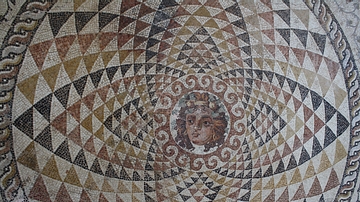Search
Search Results

Definition
Peloponnesian League
The Peloponnesian League (c. 550 BCE - c. 366 BCE) was a loose confederation of Greek city-states led by Sparta. The League was the oldest and longest-lasting political association in the ancient Greek world. For Sparta, the League gave it...

Definition
Corinth
Corinth was a Greek, Hellenistic and Roman city located on the isthmus which connects mainland Greece with the Peloponnese. Surrounded by fertile plains and blessed with natural springs, ancient Corinth was a centre of trade, had a naval...

Definition
Amphictyonic League
The Amphictyonic League was an early form of religious council in ancient Greece. It was typically composed of delegates from several tribes or ethnes living in the vicinity of a major, prosperous sanctuary, who then collaborated in supervising...

Definition
Aetolian League
The Aetolian League was an ancient Greek alliance of the tribes that lived west of Athens and north of the Peloponnese. The league was probably first established in the early 4th century BCE, reached its peak during the Hellenistic Period...

Definition
Peloponnesian War
The Peloponnesian War between Athens and Sparta and their respective allies came in two stages: from c. 460 to 446 and from 431 to 404 BCE. With battles at home and abroad, the long and complex conflict was damaging to both sides. Sparta...

Definition
Schmalkaldic War
The Schmalkaldic War (1546-1547) was fought between the Protestant Schmalkaldic League and the Catholic armies under Charles V, Holy Roman Emperor, who, having failed to achieve religious unity of his subjects at the Diet of Augsburg in 1530...

Definition
Periander
Periander was the second tyrant of Corinth (d. c. 587 BCE); Diogenes Laertius only mentions that he was eighty when he died, meaning that he was probably born c. 667 BCE. His father Cypselus (r. 657-627 BCE), from whom the short-lived Cypselid...

Definition
Peloponnese
The Peloponnese is a large peninsula linked to the northern territory of Greece by the Isthmus of Corinth. To the west of the Peloponnese is the Ionian sea while to the east is the Aegean Sea. The terrain is typified by high limestone mountains...

Image
Dionysos Roman Mosaic Floor, Corinth
Central panel from tesselated floor of a Roman villa (second half 2nd Century BCE), Corinth. Depicted is Dionysos with fruit and ivy in his hair. Corinth Archaeological Museum.

Image
Phrygian Captive, Corinth
Colossal statue of a Phrygian Captive used as a pier in the 'Captives Facade' of the north Basilica, Corinth (second half 2nd century to early 3rd century CE), Corinth Archaeological Museum.